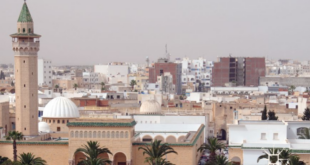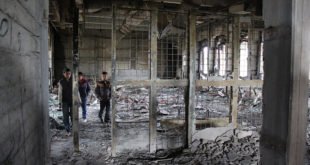| Video Cairo Sat has for almost thirty years been providing news production services to TV broadcasters around the world. Now, with the legalization of private satellite channels in Egypt, VCS is launching Cairo Sat News, its own satellite news channel. TBS Managing Editor Sarah Sullivan talked to VCS's Managing Director Ibrahim Nawar in Cairo about the company's plans for expansion. Sarah Sullivan: For many years Video Cairo Sat has been in the business of providing production services for other broadcasters. Now you're becoming broadcasters yourselves—how are you making the transition?Ibrahim Nawar: When VCS started, it was as a service provider which didn't have an initiative in creating or producing news. This restructuring we're talking about now is about creating the capabilities for news production and to be in control of the production process. We're transforming the company itself from a pure service provider to a news production company. This is the first step, to launch a news channel.Sullivan: How many hours a day do you plan to broadcast? You currently have a daily news bulletin? Nawar: When we launch it won't be 24-hour, but the plan is to work up to 24-hour. We've been doing a news bulletin, which we stopped temporarily during the restructuring process. The aim is to produce a news bulletin at the top of the hour every hour, rather than just one bulletin a day as we did before. We're going to produce news not only from Egypt but related to developments in other Arab countries as well. Sullivan: Does that mean you have permanent staff in other countries? |
|
| Nawar: We started by opening a Jerusalem office, and we have a reporter, camera crew, uplink facility and production facilities there. This is our first overseas operation. We cooperate with other companies in other countries to coordinate production from other points for the time being, but we're planning to have office in Washington, Dubai, Lebanon, and Morocco. |
In the news business competition is vital and very exciting—you compete every second, every second counts. |
| Sullivan: It seems then that the transition you're talking about, from service provider to news producer, is a natural one. You have the infrastructure in place, with reporters, studios, equipment, and experience, and also a reputation for quality service with broadcasters around the world.Nawar: That's exactly right-when Video Cairo started, we started building confidence and credibility, and others came to rely on us more and more. This puts more responsibilities on us, and it's natural that we would expand from that. We host CNN production, Dubai Business Channel production, Al-Jazeera, Rai Uno, ZDF, Abu Dhabi TV, and provide the news sectors of Egyptian TV with editorial and technical support. And we work for other companies and operations--for example, when the latest archaeological discoveries were made in Saqqara, National Geographic contacted us and cooperated in covering the event. So besides the news there are special projects, documentaries and features.
Sullivan: As your restructuring takes place, and Video Cairo focuses more and more on your own news production for you own channel, what happens to the services you've been providing for others? Will you continue with it? In other words, is doing your own news coverage a shift in the company's focus, or is it an expansion? Nawar: It's an expansion-we'll keep Video Cairo production as it is, and develop it. But in the meantime we're creating the infrastructure for our own news channel. We're creating a newsroom, new technical facilities, new editorial support to boost the project. But this will not come at the expense of the existing projects. Sullivan: You have SNG [satellite news gathering] capabilities—what does this mean in terms of helping you serve your clients? Nawar: This provides very, very valuable services to our clients. For example, during the round of Israeli-Palestinian negotiations held in Taba we decided to send the SNG a day ahead of the negotiations. Two days later other people started to come in, but we were there first. Most of the early reports coming out of Taba were from us. We established an editorial services there as well; with the SNG we sent editorial and production teams. Sullivan: Which stations were you providing for? Nawar: Sky, Reuters, AP, CNN, French channel 2, BBC, most of the big stations worked through us in Taba. A few days later we sent the SNG to Libya just ahead of the Lockerbie verdict. We thought that when the verdict is announced, whichever way it went, Libya would be a focus point of the world's attention. So we sent our production facilities and SNG there; on the day of the verdict we had everything in place, and again serviced much of the world's broadcasters interested in monitoring the story. We had as well editorial and production support, again. When Kaddafi had his news conference, we were the ones who were there and who transmitted it to the world. We've done the same thing in Syria when Asad died, during King Hussein's funeral, during the Sharm el-Sheikh summit, President Mubarak's visit to the Vatican. Sullivan: What exactly do you mean by "editorial support?" Nawar: We do two things: we do the research for reporters, and we have our own reporters as well. We have teams of researchers both here in Cairo and on location; they follow an event and keep in contact with our people in the field to provide them with background and data. And as I mentioned earlier we have reporters too, as in Jerusalem. Sullivan: There have been problems recently between the Egyptian government and Al-Jazeera, and Video Cairo took some of the flak. Do you still work with Al-Jazeera? Nawar: Absolutely, more so than ever. We have an office in 6th of October Media Production City, and they're planning to have facilities out there as well, and we hope the cooperation will expand. Sullivan: The legalization of private satellite channels in Egypt happened only quite recently. When did you make the decision to enter into this expansion? Nawar: Last year when the prime minister issued his decree concerning the Media Free Zone, giving the private sector the right to set up TV channels, that was the first indication from the government that the private sector could move into full gear in these areas that were prohibited before. Before only state TV was allowed to transmit. Now, with the Media Free Zone, the private sector was invited in to contribute to TV production. Of course, in talking about TV production you must differentiate between news production and any other type of production. With news production there are still more regulations. This is why the project is a little slow, it takes time. There are regulations we have to fulfill, and that's the process we're going through. Sullivan: What facilities do you have in Media Production City? Nawar: Right now we just have office space, but we're planning a newsroom and studios for news, and teleport. It'll be a complete news center, including uplink and downlink facilities, editorial facilities, studio space. We'll keep this office; we already have a fiber-optic line from here to 6th of October. We have two channels reserved on Nilesat, used for our business-to-business use and then, when we start transmitting, for our own use. Sullivan: Setting up news, as opposed to setting up a game show, talk show, music show, or any other type of program must take more time and money to get the infrastructure in place—you have to have the trained staff, equipment, everything that gives you the ability to do serious news coverage. Is there anyone else in Egypt setting up a private satellite news channel? Nawar: There has been a license granted to Al-Mehwar, which is going to do news, and that's the only one issued so far. We've applied for the license, but it's still going through the process. Al-Mehwar got its license last year. We hope they go on-air soon—we like competition. In the news business competition is vital and very exciting--you compete every second, every second counts. It's not like with documentaries, where you work for months on a piece; you have to make the right decisions in seconds. It's beneficial to have more than one private news channel in Egypt; it'll give the viewers the best. If Al-Mehwar and Cairo Sat News both go on air, plus the existing Nile News and Nile TV, it'll create competition in the market. There will be at least four players in the Egyptian satellite news field, and this will give viewers much more than just one or two players can. Sullivan: But once you're up on satellite, you're not competing just with other players in your country. Nawar: That's right, it's pan-Arab competition. When I talk about Egyptian competition that's within the realm of legal issues and the legal framework. But once you're on air on satellite, the whole world is the playing field, not even just the Arab world. It's everywhere Arabs live—in America, Asia, Latin America, everywhere. You compete with whoever can reach the same places. We see some gaps in the market-although there are lots of TV news channels on satellite, almost all of them share some of the same features. Here in the Middle East most of the pan-Arab satellite news channels are from the Gulf region. MBC is Saudi, although it's based in London. Al-Jazeera is Qatari. Abu Dhabi TV and the Dubai channels. The only competition is LBC from Lebanon and the Egyptian channels. LBC's main advertising market is Saudi Arabia, so they still hold to Gulf concerns. What Cairo Sat News wants to provide is something different. Egypt is a different culture, a different civilization, a different political situation. We want to enhance choices in the regional market by providing a different perspective than the Gulf channels do. Egypt is the most populated country in the region, with the longest history, and a lot of people across the region are interested in what goes on here. Our channel should represent the essence of Egyptian life from a news angle. Sullivan: What type of news will you cover? Nawar: It's a comprehensive concept of news, not just political news but also business news, cultural news, sports, fashion. There's great regional interest in Egyptian culture, music, films, sports. I've worked for other Arab TV and newspapers, and a third to a half of the material we used came from Egypt. There are experts here in many areas, great resources, access to information. Where else in the region can you find fifty different experts interested in the same subject, each of them able to provide something unique and make a genuine contribution? We want to capitalize on the resources we have here. Sullivan: When do you hope to be on air? Nawar: I hope to be on air by next year. But we don't have a strict timetable because it's vital to take things step by step, make sure the company is properly structured. To launch a news channel you have to be standing on very solid ground. We're working on taking the resources we already have and expanding on them, and making sure that each piece is in place. |
|
Check Also
Filling in the Blanks: New book dives into the tragedy and complexity of post-Gadhafi Libya
Since the uprisings that spread across the Arab region took hold in Libya in 2011 …
 Arab Media & Society The Arab Media Hub
Arab Media & Society The Arab Media Hub




